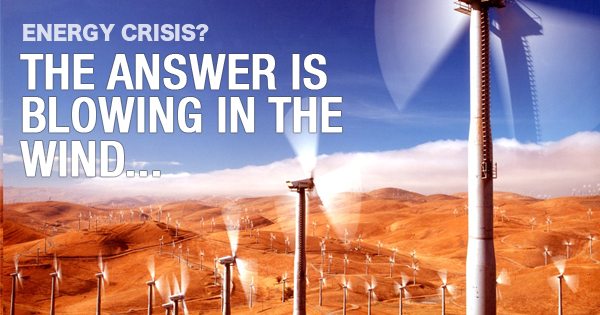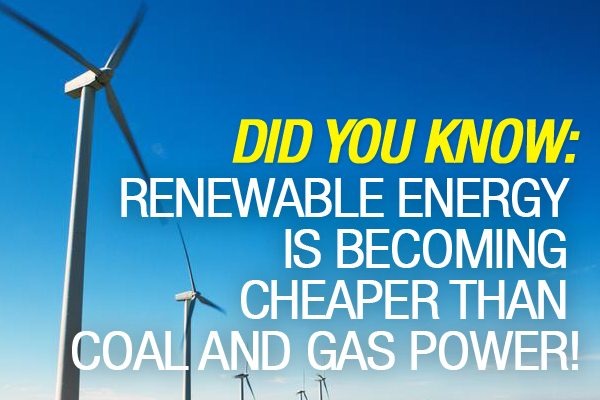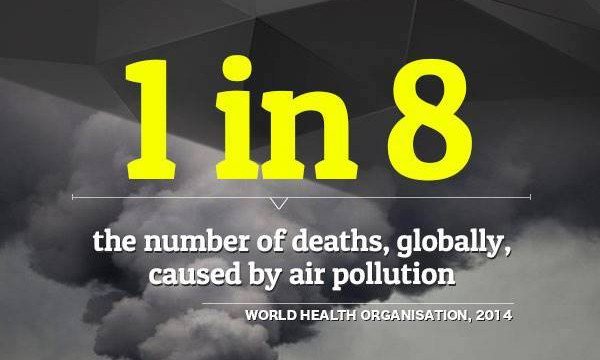It’s no secret most Australians love renewable energy. But with Australian Treasurer Joe Hockey dismissing wind farms as “appalling” and “utterly offensive”, maybe it’s time we reminded ourselves why wind energy is great for Australia and the world.

Wind power has an important role to play in reducing Australia’s contribution to dangerous climate change. And it’s not just in Australia that wind has great potential. Alongside the Global Wind Energy Council, Greenpeace have just released a report on the status of wind energy, detailing how it could contribute to global energy supply in the future. Here are some of the best facts from the report:
1. Wind power lowers carbon emissions
In 5 years, wind power could prevent more than a billion tonnes of CO2 from being emitted each year! That’s the equivalent of:
- Two thirds of India’s total emissions
- All the emissions of Japan
- Germany’s and Italy’s emissions combined
- Africa’s total CO2 emissions
2. Helps meet our global energy needs
In fifteen years, wind power could be supplying up to 19% of the world’s electricity – and by 2050, up to 25-30% of global power could come from wind.
3. Incredible growth
If you need any proof about the possibilities wind energy holds – you only need to look at the recent past. Over the last 18 years, the wind industry has grown at around 26% per year.
4. Affordable energy
Why is wind becoming more and more popular? Prices keep falling! Wind power has become the least-cost option for adding new power capacity to the grid in markets around the world.
So why do you hear that renewable energy is too expensive? Right now, the fossil fuel industry is heavily subsidised and if its subsidies were stripped away then renewable energy would be cheaper than coal and gas power.
And it’s not just that – there are also no input costs for wind and solar energy. While coal-fired power plants need more and more coal to generate electricity – wind is free!
5. Job creation
There is also good news for jobs. Around 600,000 people currently work in the wind power industry. That figure could rise to around 1.5 million by 2020 and exceed 2 million jobs by 2030.
6. From darkness to light – fast!
But what also makes wind power attractive is its ‘scalability’ and the speed that power can be brought on line. That’s particularly important where people have no access to electricity.
7. Low pollution
Forget the claim by sceptics that more energy is used in manufacturing wind turbines than they supply. A wind turbine ‘pays back’ all of the carbon dioxide emissions from its manufacturing, installation, servicing and decommissioning in its first three to nine months of operation. That means pollution-free power for the rest of its 20-year design lifetime.
8. Better for wildlife
A common argument against wind farms is that they kill birds and bats. However, if environmental impact assessments are conducted and migratory patterns are assessed before construction, the impact is greatly reduced.
Of course every effort should be made to minimise this impact, but it should also be looked at in the context of other projects and their effect on birds. Coal power plants have a far greater effect on birds, with coal mining, onsite collision and electrocution, downstream poisoning, acid rain, mercury pollution and climate change all causing significant bird deaths. In fact, if we replaced all fossil fuel generation with wind turbines worldwide we would save roughly 70 million birds’ lives every year.
9. Beating global warming
Why all this is important is because the power sector pumps out more than 40% of all CO2 emissions from burning fossil fuels.
Wind power is an ideal technology to achieve early reductions in carbon pollution and to keep the window open to avoid global warming crossing the 2°C ‘danger’ threshold. But time is short for meeting climate protection targets and ensuring that global emissions peak and decline during this decade.
Capturing all of the future opportunities for wind power will once again depend on convincing reluctant policymakers and overcoming the vested interests of the fossil fuel lobby.




